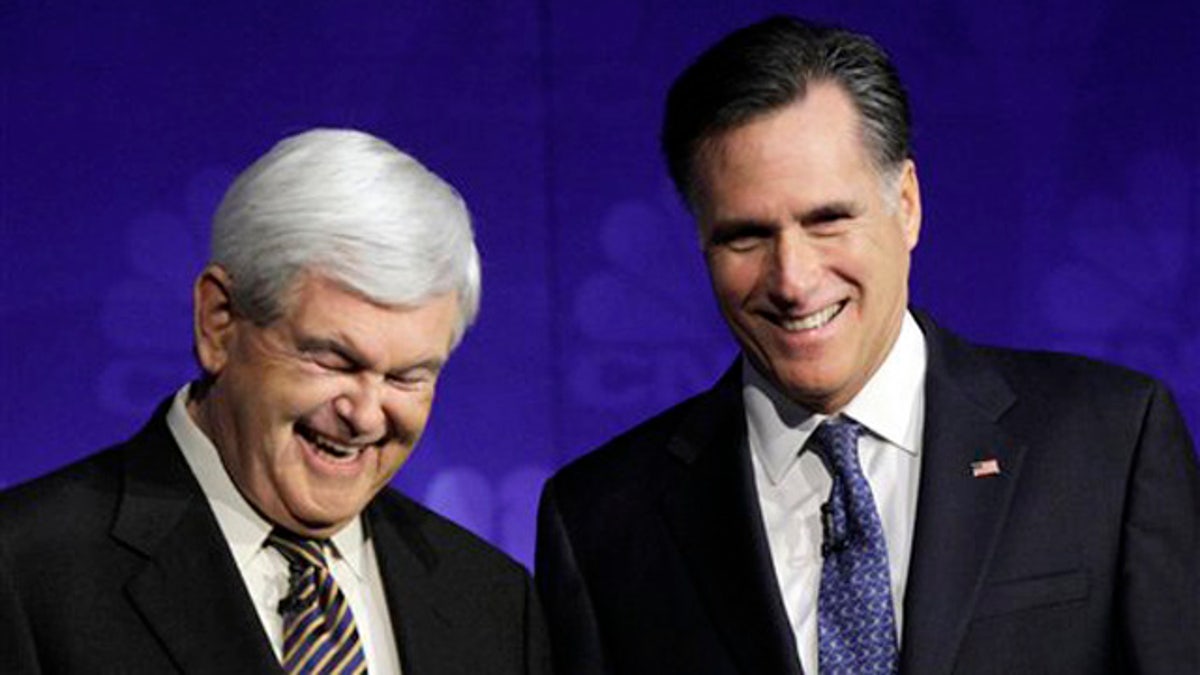
Nov. 9, 2011: Republican presidential candidates former House Speaker Newt Gingrich and former Massachusetts Gov. Mitt Romney laugh before a Republican presidential debate at Oakland University in Auburn Hills, Mich. (AP)
DES MOINES, Iowa – With just five weeks remaining until the first votes are cast in Iowa's presidential caucuses, the latest polls in early primary states show a two-man contest developing between former Massachusetts governor Mitt Romney and former House Speaker Newt Gingrich.
In New Hampshire, Romney, who has held a steady lead in the state throughout the primary process, is seeing a surprisingly strong challenger in Gingrich, who received the coveted endorsement of the Union Leader, the state's largest newspaper, over the weekend.
Dante Scala, associate professor of Political Science at the University of New Hampshire, told NewsCore that while Romney's lead in New Hampshire has held steady, Gingrich may be able to fill the vacuum to Romney's right.
"Very conservative voters in the Granite State have been waiting for a viable alternative to Romney all year -- and they're running out of options. Newt might just fit the bill," Scala said.
"If he can win Iowa, the national media may frame New Hampshire as a two-man race. That could make a sleepy race look interesting awfully quickly."
In Iowa, a RealClearPolitics average of recent Iowa polls shows that Gingrich is indeed pulling away from the top four candidates. The former House speaker leads the RCP average with 22 percent support, ahead of Romney and former Godfather's Pizza CEO Herman Cain with 17 percent each and Texas Rep. Ron Paul -- who many believe has the best campaign infrastructure in the Hawkeye State -- with 13 percent.
In his second run for the presidency, Romney -- still the nominal frontrunner nationally -- chose to make New Hampshire his firewall state and has downplayed expectations in Iowa by making infrequent visits to the state that was central to his 2008 campaign strategy.
While his lack of attention has angered several party leaders, he remains competitive in the state despite skepticism from its large population of evangelical voters wary of his Mormon faith and past stance on abortion.
His campaign recently opened a campaign office in Des Moines and has started sending direct mail to Iowa voters, affirming his pro-life and family values credentials. Romney aides also say that while winning the Jan. 3 caucuses is not essential, the candidate will make more regular visits in the coming weeks.
"We've always said we're contesting Iowa," Romney's Iowa state director David Kochel told The Washington Post recently. "It should be no surprise, given all the number of days we spent here four years ago, that we maintain a level of support, and that's a good thing."
In the last two weeks, conventional wisdom inside the Beltway has said Gingrich needs a victory in Iowa to seriously challenge the former Massachusetts governor for the nomination. While an Iowa win for Romney followed by a decisive victory in New Hampshire would likely lock up the nomination, his campaign would be equally pleased with a Paul victory in Iowa, which would essentially knock the wind out of Gingrich's sails.
As the Des Moines Register has noted, this year's race has upended the conventional wisdom about vote-getting in the first-in-the-nation caucus state.
In past years, presidential campaigns operated under the assumption that frequent visits to The Hawkeye State and extensive ground operations were key to winning the caucuses. Prior to Gingrich's ascent, Cain topped most state polls in October and early November despite only having visited the state just three times since August. Meanwhile, former Pennsylvania Sen. Rick Santorum has traveled to all of Iowa's 99 counties without seeing an uptick in the polls.
This primary election season has also undermined the importance of the Ames Straw Poll in August, which was previously considered a bellwether of the Iowa caucuses results.
Minnesota Rep. Michele Bachmann won the straw poll in August, but her support has since dropped to just 5 percent in a recent Bloomberg poll of likely caucus-goers. And despite spending over $1 million contesting the poll in 2008, Romney chose to skip the event altogether this time round.
Cain's recent troubles -- including sexual harassment allegations dating back to his tenure as president of the National Restaurant Association in the 1990s -- and Texas Gov. Rick Perry's inability to rally Iowa's social conservatives has opened the door for Gingrich to step in as the new frontrunner.
The race also remains surprisingly fluid in New Hampshire, which will hold the nation's first primary on Jan. 10 and where recent polls reinforce the idea that despite holding a healthy double-digit lead over his nearest rival, many of the state's conservatives remain reluctant to embrace Romney.
The Union Leader's backing of Gingrich early Sunday was another blow to Romney in his must-win state.
While the influential paper's editorial did not mention Romney by name, it implicitly criticized the former governor of neighboring Massachusetts, saying, "We would rather back someone with whom we may sometimes disagree than one who tells us what he thinks we want to hear," a criticism often repeated by his Republican rivals and President Barack Obama's 2012 re-election team. Publisher Joe McQuaid, who penned the op-ed, later told Fox News that he was indeed referring to Romney.
It remains to be seen, however, how much weight the newspaper's backing will carry with New Hampshire voters. While the Union Leader endorsement is coveted, the paper does not always choose the winning candidate. It endorsed Steve Forbes over George W. Bush in 2000 and threw its weight behind Pat Buchanan over Bob Dole in 1996.
After New Hampshire, voting will continue in the southeast, where Republican primary voters in South Carolina and Florida will have their say on Jan. 21 and 31 respectively.
A dearth of polls in South Carolina has made predicting the state's winner difficult. Gingrich and Cain have occupied the top two slots in recent surveys while Perry's inadequate debate performances have seen his support in the Palmetto State drop from 30 percent over the summer to a meager seven percent today.
Cain, who could be thrown a lifeline with a strong finish in South Carolina, is keen to stress that he is not out of the race.
After admitting that the recent sexual harassment accusations had hindered his candidacy, Cain told Fox News on Monday morning that he expected his campaign to rebound. "We have no concern whatsoever that we're going to be able to move back up over the next several weeks," he said.
While Gingrich appears to be benefiting from Cain's stumbles in South Carolina, Romney has more to gain in the general election swing-state of Florida. The former Massachusetts governor has cultivated a strong base of support in The Sunshine State, whose huge delegate haul is up for grabs in a winner-take-all system that could prove to be the decisive tie-breaker following a split decision in the first three states. He has also assiduously courted the state's senior citizens with pledges to protect entitlement programs like Medicare and Social Security.
The state currently seems to be a three-way dogfight between Cain, Romney and Gingrich, but Romney's superior fundraising will be a clear advantage in a populous, media-friendly state that is better suited to TV airtime than retail politics.
While Iowa, New Hampshire and South Carolina will each provide crucial momentum for winning candidates, Florida's 50 delegates -- just 15 less than the first three states combined -- could essentially sew up the nomination the way it did for Arizona Sen. John McCain four years ago.




